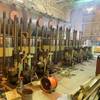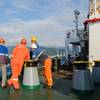The Tacoma Daily said ports of Seattle, Tacoma and Vancouver, Canada have proposed performance goals to reduce particulate matter by 70 percent from ships at berth and 30 percent from cargo handling equipment, according to the Pacific Northwest Ports Clean Air Strategy announced Wednesday.
The strategy proposes performance goals aimed at reducing diesel emissions and greenhouse gases from port-related sources.
The three ports plan to accomplish the emissions reduction goals for ships and cargo handling equipment by 2010. The strategy also will address emissions from port-related truck, train and harbor craft activity and includes long-term goals for additional emissions reductions.
A framework plan was released Wednesday, but the ports will continue to work together over the summer with their customers, tenants and other stakeholders to iron out the details. The plan will be submitted in the fall to the Port of Seattle and Port of Tacoma Commissions and to the Vancouver Port Authority Board of Directors for final approval in December.
As the emissions reduction plan is further developed, the three ports will identify specific performance goals and emissions reduction targets for port-related trucking, rail and harbor craft (ferries, tug boats, etc.) activities. Goals already have been proposed for ocean-going vessels and cargo-handling equipment. Performance goals set clear targets but do not prescribe how to reach those targets.
For cargo ships and cruise ships that make regularly scheduled calls at the three ports, the proposed performance goal calls for a reduction in particulate matter equivalent to what can be achieved by using cleaner fuels while tied up at the pier. That would result in a 70 percent reduction in fine particulate matter by 2010.
Railroads and harbor craft operators typically do not conduct most of their business on port-owned properties. The plan calls for the ports to work with the railroads to implement existing emissions reduction measures and to explore new technologies as they become available. In regard to harbor craft, local and regional air agencies, such as the Puget Sound Clean Air Agency will take the lead.
As the plan is finalized, the ports will ask stakeholder groups to help implement emissions reduction measures and formally sign on as partners.
Sponsored Content
Innovative Hull Maintenance: Profitable & Green

Subscribe for
Maritime Reporter E-News
Maritime Reporter E-News is the maritime industry's largest circulation and most authoritative ENews Service, delivered to your Email five times per week











